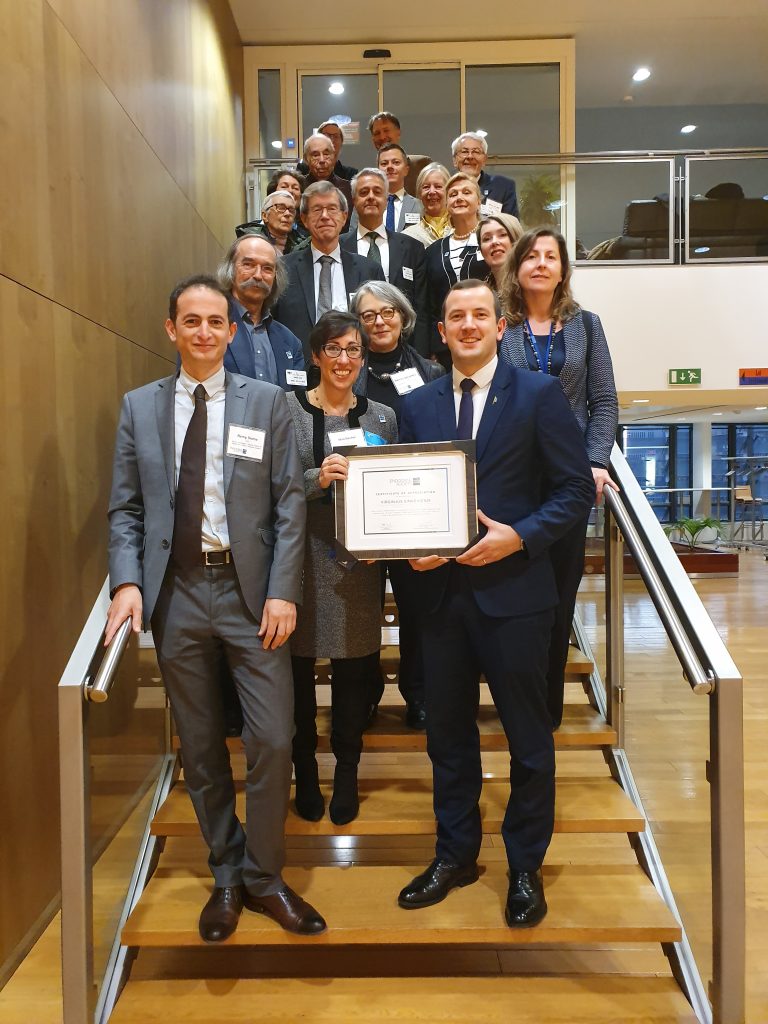On December 3-4, following the 2019 European Union (EU) elections and with the installment of the new European Commission, the Endocrine Society brought members from seven EU Member States to Brussels to meet with policy makers and urge them to take action on endocrine-disrupting chemicals (EDCs). A full day of meetings began with a briefing for Members of the European Parliament on the latest science about the health effects of EDCs.
Swedish Member of Parliament (MEP) Jytte Guteland sponsored the briefing and shared her experience having her blood tested to discover the levels of EDCs already in her body. Endocrine Society members Barbara Demeneix, PhD, DSc, and Remy Slama, PhD, were invited to describe findings from their report to the Parliament earlier in the year summarizing the scientific evidence for EDC-related harms and calling on policy makers to address regulatory gaps that result in exposures to EDCs. Bjorn Hansen, executive director of the European Chemicals Agency (ECHA), and Christina de-Avila, head of Sustainable Chemicals Unit in the Directorate-General for the Environment, participated in the briefing to give attendees an overview of progress ECHA and the Commission have made towards the regulation of EDCs, such as exploring class-based approaches to categories of EDCs. Following an open discussion where MEPs had the opportunity to ask questions of the gathered scientists, Slovakian MEP Martin Hojsik delivered closing remarks with a strong call to action.
Nine MEPs attended the briefing, along with staff from other MEP offices representing multiple political parties, reflecting the increased attention that EDCs are receiving as a result of consistent pressure from the Endocrine Society and other stakeholders. The gathered policy makers at the briefing were keenly interested in hearing the perspectives of our expert scientists and clinicians and learning about how EDCs affect different body systems, such as the intestinal microbiome. They also wanted to hear more about the evidence linking EDCs to specific diseases, including cancer.

Following the briefing, we went to the European Commission offices to meet with the newly installed Commissioner for the Environment, Oceans and Fisheries, Virginijus Sinkevičius. Our members reiterated the strong scientific consensus on the health effects of EDCs, including effects on fertility, cancer, and thyroid biology. We encouraged the commissioner to prioritize action on EDCs early and often during his term, and he welcomed our input and advice on how the EU could continue its leadership role in regulating EDCs.
Throughout the meetings, we reminded policy makers of the important accomplishments that EU legislators made during the previous term to identify and regulate EDCs. We encouraged them to maintain momentum, specifically by advancing legislative proposals to close existing regulatory gaps for EDCS in consumer products such as cosmetics and food packaging materials. We were encouraged by two recent developments in the EU. The European Green Deal, presented by European Commission President Ursula von der Leyen on December 12, includes a call for legislative changes that would reflect rapidly developing science on the risks posed by EDCs. The Joint Research Centre also launched a “fitness check” to consider whether the existing legislative landscape is sufficiently fit-for-purpose to regulate EDCs.
We welcome the inclusion of EDCs in the Green Deal and will work closely with our expert members to develop a comprehensive response to the fitness check. We also plan to keep pressure on EU policy makers to take action on EDCs in 2020.

